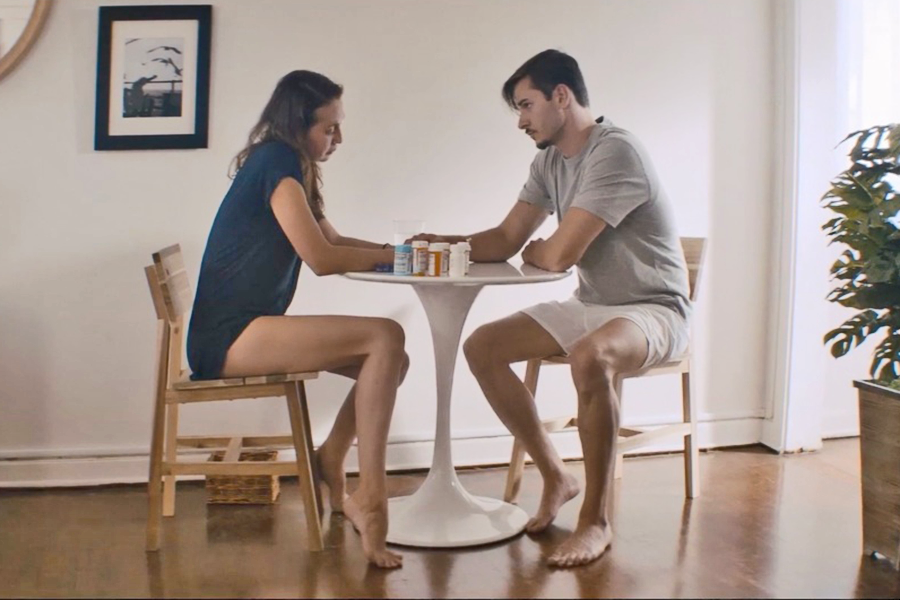“Elizabeth Blue” is a heartfelt and compelling film about how the title character (Anna Schafer) and her fiancé Grant (Ryan Vincent) cope with her schizophrenia. The film, which opens Sept. 22 at the Prince Theater’s Black Box, is directed and cowritten by Vincent Sabella and produced by his husband, Joe Dain. It is based on the couple’s real-life experiences with Sabella’s schizophrenia.
Dain, who was born and raised in South Philly and graduated from the High School for the Creative and Performing Arts, chatted with PGN about making “Elizabeth Blue” and sharing his very personal story.
PGN: Can you talk about how you came to make this film and tell Vincent’s and your story?
JD: “Elizabeth Blue” originated as a script I purchased. It was a comedy about a young woman suffering from mental illness trying to plan her wedding. It came up in conversation for Vin to tackle, and he pitched the idea of incorporating our experiences with his own mental-health challenges in 2010, when his medications failed him. I took a year off work to care for him back then because I would not place him in a mental institution.
PGN: I imagine making the film triggered some strong emotions. Were there any episodes on set?
JD: Making the film brought up some things, and Vin hit some bumps along the way, but we made it a point to tell the cast and crew that there will possibly be some days where Vin will have an episode and leave the set. In those cases, I would step in and complete directing the scene. That happened twice, but the cast and crew rallied behind us and were supportive.
PGN: I understand you filmed some real-life events during that difficult year that made their way into “Elizabeth Blue.”
JD: Yes. The “train” scene literally happened in our house. I recorded some of his episodes. I wanted Vin to see [his behavior] at a different time. A lot of that year was a blur for him, so it was helpful to revisit these episodes and for the cast to see the physicality of his hallucinations, or how he looked in a particular state of mind.
PGN: Even though the film is based on your life with Vincent, “Elizabeth Blue” is about a heterosexual couple. Can you discuss that decision?
JD: Vin made it a heterosexual couple because not as many people would see this if it was about a gay couple. That’s an unfortunate truth about the industry. It wasn’t about us; it was about tackling this serious mental-health issue.
PGN: The character of Grant is a thinly veiled version of you. Can you talk about how you worked with actor Ryan Vincent on the character?
JD: Ryan was intrigued by this concept that Grant loved Elizabeth no matter what her mental health or state of mind was. Ryan engaged with my deep affection and love for Vin, but also my ability to grapple with something that is difficult for many people. I wanted Ryan to understand that his character, while he’s human, he’s fearless. What motivates him the most is his love for her, and that surmounts any bad times. That’s not to say it wasn’t difficult for me, but I came to accept Vin’s mental health as a part of whom he is. There’s a message for people at large that love conquers all, and while that’s a slogan for many, those who have dealt with any major illness know our ability and capacity to love is incredible.
PGN: You made some sacrifices to care for Vin as he tried to get back to “normal” with his mental illness. Can you talk about that?
JD: I think more people have the instinct to walk away than stand by. It’s more difficult if it’s a parent or sibling rather than a spouse or boyfriend or girlfriend. For me, I look at illness as a part of who we are and being human. We all suffer from something — or we will suffer from something. I’m not a quitter. I’m not walking away, or afraid of mental illness or talking about it. What’s interesting is I am more vocal about this now than I was when we were going through that very tough year. The caretakers of those who suffer feel so isolated and alone and have no one to turn to or understand. We can say we have a loved one who has cancer, or has heart disease or is in recovery. But how do you sit down and say, “My husband was hiding in the closet screaming from the hallucination that was attacking him?” It’s not something people know how to respond to. We need more people talking about it. The minute you make it OK to talk about it, people talk about it and they are so thankful and appreciative.
On Sept. 25, Vincent Sabella, Joe Dain and actor Anna Schafer will participate in a post-screening discussion of “Elizabeth Blue” at the Prince Theater’s Black Box.
